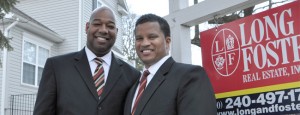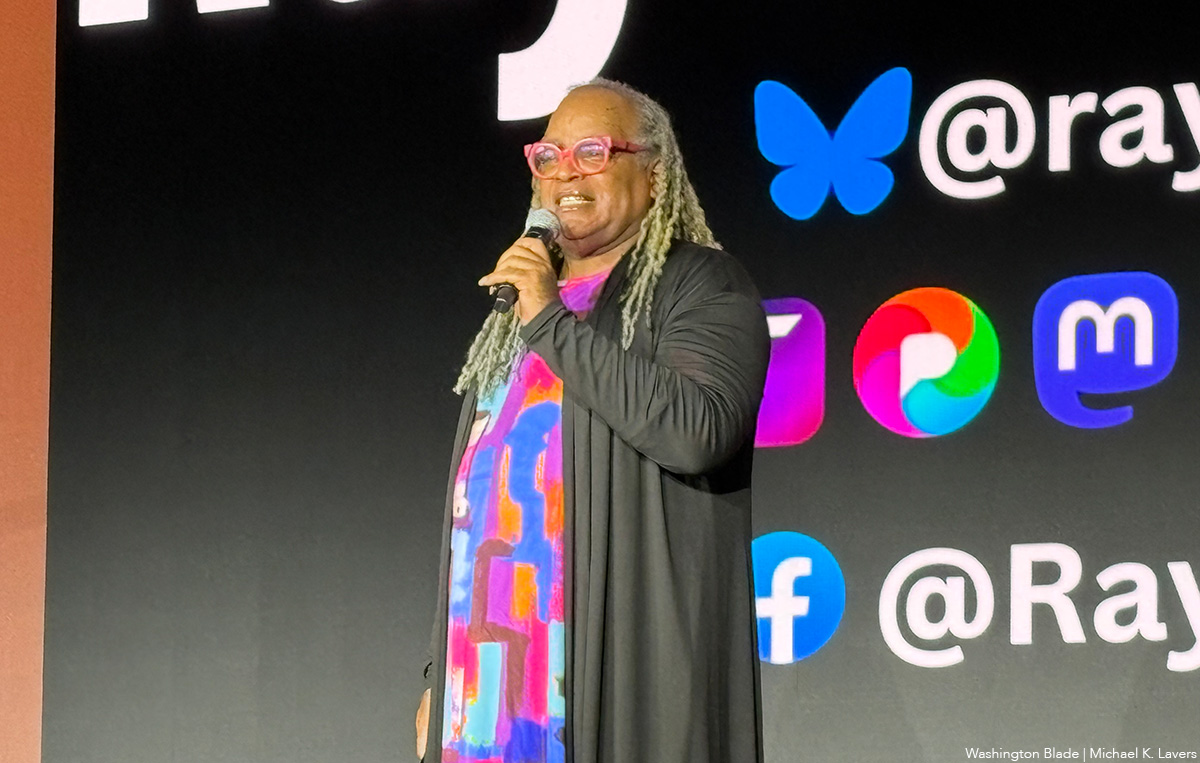Local
Marriage law prompts gay Md. couple to move to D.C.
Gansler opinion not enough to keep Silver Spring pair from selling house

DeWayne Davis (left) and Kareem Murphy of Silver Spring, Md., are selling their home and moving to D.C. to enjoy the benefits of marriage. (DC Agenda photo by Michael Key)
Kareem Murphy and DeWayne Davis of Silver Spring, Md., have been together for nearly 19 years.
The two gay men, who are active members of D.C.’s Metropolitan Community Church, said they have been grappling for several years over whether to remain in Maryland or move back to the District, where they lived in the 1990s.
“Moving back to D.C. was attractive, but when the marriage issue took off it made the choice between Maryland and D.C. very clear in D.C.’s favor,” said Murphy, a lobbyist with a firm that represents local municipal governments.
“It kind of sealed the deal,” he said, referring to the D.C. same-sex marriage law that took effect Wednesday.
The couple has placed their Silver Spring house up for sale and is actively looking for a new home in the District.
Murphy and Davis, both 38 and graduates of Howard University, belong to a demographic group that gay activists and city officials say they will closely monitor over the next year or two to measure the economic impact of same-sex marriage in the nation’s capital.
An analysis prepared by the staff of D.C.’s chief financial officer estimates that the city would see a multi-million dollar increase in tax and business revenue during the first few years of legalized gay marriage. The tax and business revenue would be generated by a surge in weddings for same-sex couples from other states as well as from the District and nearby suburbs.
Studies conducted in other states that have legalized same-sex marriage have also found that gay male and lesbian couples have moved into those states for the sole purpose of being able to marry.
Davis, a former congressional staffer and lobbyist, recently left the realm of politics to enter D.C.’s Wesley Theological Seminary to become a minister. He said he and Murphy are rearranging their lives to move into the District not because of economic issues but because marriage is an important component of their faith-based beliefs.
“It has been made that much more important for us because we really want to be married,” Davis said. “We’ve called ourselves married and we’ve debated many times about going places to get married. But we’ve always said we didn’t want to move out of this area to marry.
“If we were going to marry, we wanted to be here, where we are. And so that was a deliberate decision we made. It was so important to us that this was going to happen in D.C.”
Murphy and Davis’ decision to move from Maryland to the District comes at a time when both jurisdictions have been rocked by ongoing struggles between same-sex marriage supporters and opponents.
In D.C., an ongoing campaign by Bishop Harry Jackson, a minister from Beltsville, Md., to overturn the city’s same-sex marriage law through proposed ballot measures and court injunctions appears to have been halted for the time being. The U.S. Supreme Court on Tuesday denied Jackson’s request for a stay to prevent the marriage law from taking effect March 3.
In Maryland, a long-awaited legal opinion by state Attorney General Douglas Gansler saying out-of-state same-sex marriages appear to have full legal standing under Maryland law has drawn the ire of conservative members of the state legislature.
Officials with Equality Maryland have hailed Gansler’s Feb. 24 opinion as an important breakthrough in efforts to bring about same-sex marriage equality in the state. But Equality Maryland Executive Director Morgan Meneses-Sheets acknowledged that the Gansler opinion has stirred up anti-gay groups and lawmakers who are mobilizing to block a same-sex marriage equality bill that activists hope to persuade the legislature to pass in 2011.
Meanwhile, Equality Maryland and other LGBT groups are studying the Gansler opinion and the response by Maryland Gov. Martin O’Malley to determine what, if any, marital rights and benefits same-sex couples in Maryland can realize in their home state if they marry in other jurisdictions, including D.C.
Gansler has said his opinion was based on a careful legal analysis showing that most lawful marriages from other states — including same-sex marriages — are recognized under Maryland law. But he noted that the state’s high court would have to make the final decision on same-sex marriage recognition if opponents challenge state agencies that provide marital rights and benefits to gay couples.
Virginia
McPike wins special election for Va. House of Delegates
Gay Alexandria City Council member becomes 8th LGBTQ member of legislature

Gay Alexandria City Council member Kirk McPike emerged as the decisive winner in a Feb. 10 special election for a seat in the Virginia House of Delegates representing Alexandria.
McPike, a Democrat, received 81.5 percent of the vote in his race against Republican Mason Butler, according to the local publication ALX Now.
He first won election to the Alexandria Council in 2021. He will be filling the House of Delegates seat being vacated by Del. Elizabeth Bennett-Parker (D-Alexandria), who won in another Feb. 10 special election for the Virginia State Senate seat being vacated by gay Sen. Adam Ebbin (D-Alexandria).
Ebbin is resigning from his Senate next week to take a position with Virginia Gov. Abigail Spanberger’s administration.
Upon taking his 5th District seat in the House of Delegate, McPike will become the eighth out LGBTQ member of the Virginia General Assembly. Among those he will be joining is Sen. Danica Roem (D-Manassas), who became the Virginia Legislature’s first transgender member when she won election to the House of Delegates in 2017 before being elected to the Senate in 2023.
“I look forward to continuing to work to address our housing crisis, the challenge of climate change, and the damaging impacts of the Trump administration on the immigrant families, LGBTQ+ Virginians, and federal employees who call Alexandria home,” McPike said in a statement after winning the Democratic nomination for the seat in a special primary held on Jan. 20.
McPike, a longtime LGBTQ rights advocate, has served for the past 13 years as chief of staff for gay U.S. Rep. Mark Takano (D-Calif.) and has remained in that position during his tenure on the Alexandria Council. He said he will resign from that position before taking office in the House of Delegates.
Local
Local LGBTQ groups, activists to commemorate Black History Month
Rayceen Pendarvis to moderate Dupont Underground panel on Sunday

LGBTQ groups in D.C. and elsewhere plan to use Black History Month as an opportunity to commemorate and celebrate Black lives and experiences.
Team Rayceen Productions has no specific events planned, but co-founder Rayceen Pendarvis will attend many functions around D.C. this month.
Pendarvis, a longtime voice in the LGBTQ community in D.C. moderated a panel at Dupont Underground on Feb. 8. The event, “Every (Body) Wants to Be a Showgirl,” will feature art from Black burlesque artists from around the country. Pendarvis on Feb. 23 will attend the showing of multimedia play at the Lincoln Theatre that commemorates the life of James Baldwin.
Equality Virginia plans to prioritize Black voices through a weekly online series, and community-based story telling. The online digital series will center Black LGBTQ voices, specifically trailblazers and activists, and contemporary Black queer and transgender people.
Narissa Rahaman, Equality Virginia’s executive director, stressed the importance of the Black queer community to the overall Pride movement, and said “Equality Virginia is proud to center those voices in our work this month and beyond.”
The Capital Pride Alliance, which hosts Pride events in D.C., has an alliance with the Center for Black Equity, which brings Black Pride to D.C. over Memorial Day weekend. The National LGBTQ Task Force has no specific Black History Month events planned, but plans to participate in online collaborations.
Cathy Renna, the Task Force’s director of communications, told the Washington Blade the organization remains committed to uplifting Black voices. “Our priority is keeping this at the forefront everyday,” she said.
The D.C. LGBTQ+ Community Center is also hosting a series of Black History Month events.
The D.C. Public Library earlier this year launched “Freedom and Resistance,” an exhibition that celebrates Black History Month and Martin Luther King Jr. It will remain on display until the middle of March at the Martin Luther King Jr. Memorial Library at 901 G St., N.W.
District of Columbia
U.S. Attorney’s Office drops hate crime charge in anti-gay assault
Case remains under investigation and ‘further charges’ could come

D.C. police announced on Feb. 9 that they had arrested two days earlier on Feb. 7 a Germantown, Md., man on a charge of simple assault with a hate crime designation after the man allegedly assaulted a gay man at 14th and Q Streets, N.W., while using “homophobic slurs.”
But D.C. Superior Court records show that prosecutors with the Office of the U.S. Attorney for D.C., which prosecutes D.C. violent crime cases, charged the arrested man only with simple assault without a hate crime designation.
In response to a request by the Washington Blade for the reason why the hate crime designation was dropped, a spokesperson for the U.S. Attorney’s office provided this response: “We continue to investigate this matter and make no mistake: should the evidence call for further charges, we will not hesitate to charge them.”
In a statement announcing the arrest in this case, D.C. police stated, “On Saturday, February 7, 2026, at approximately 7:45 p.m. the victim and suspect were in the 1500 block of 14th Street, Northwest. The suspect requested a ‘high five’ from the victim. The victim declined and continued walking,” the statement says.
“The suspect assaulted the victim and used homophobic slurs,” the police statement continues. “The suspect was apprehended by responding officers.”
It adds that 26-year-old Dean Edmundson of Germantown, Md. “was arrested and charged with Simple Assault (Hate/Bias).” The statement also adds, “A designation as a hate crime by MPD does not mean that prosecutors will prosecute it as a hate crime.”
Under D.C.’s Bias Related Crime Act of 1989, penalties for crimes motivated by prejudice against individuals based on race, religion, sexual orientation, gender identity, disability, and homelessness can be enhanced by a court upon conviction by one and a half times greater than the penalty of the underlying crime.
Prosecutors in the past both in D.C. and other states have said they sometimes decide not to include a hate crime designation in assault cases if they don’t think the evidence is sufficient to obtain a conviction by a jury. In some instances, prosecutors have said they were concerned that a skeptical jury might decide to find a defendant not guilty of the underlying assault charge if they did not believe a motive of hate was involved.
A more detailed arrest affidavit filed by D.C. police in Superior Court appears to support the charge of a hate crime designation.
“The victim stated that they refused to High-Five Defendant Edmondson, which, upon that happening, Defendant Edmondson started walking behind both the victim and witness, calling the victim, “bald, ugly, and gay,” the arrest affidavit states.
“The victim stated that upon being called that, Defendant Edmundson pushed the victim with both hands, shoving them, causing the victim to feel the force of the push,” the affidavit continues. “The victim stated that they felt offended and that they were also gay,” it says.

















